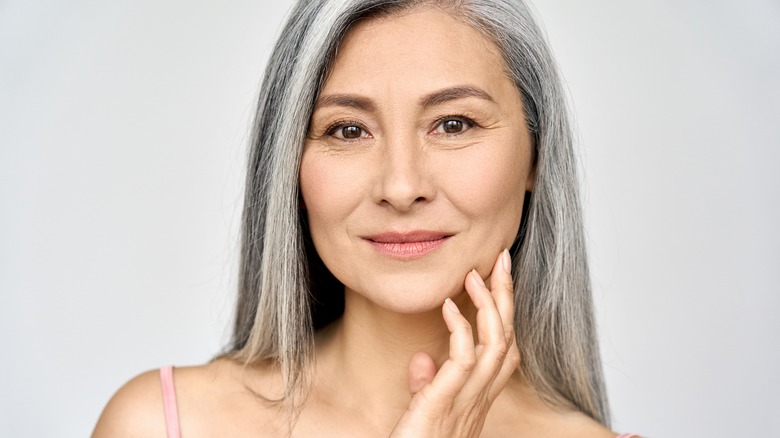What To Do When Your Body's Natural Collagen Levels Start Decreasing
Fine lines, wrinkles, dry, papery skin, joint pain, and stiffness. Why do these symptoms of aging occur, and is there any way to prevent them? Collagen could help prevent premature aging and help you look and feel younger for longer. Medical News Today says collagen is the most abundant protein in the body, providing support for bones, joints, cartilage, tendons, and skin. Collagen supports elasticity and strength in the skin, and when you are younger, collagen production is plentiful. But according to WebMD, as you age, the body stops producing as much collagen as it once did.
Sun exposure, sugar, and smoking can deplete collagen in the body. Healthline warns that margarine, which is packed with partially hydrogenated oils, can damage the skin. And processed meats high in sodium, saturated fats, and damaging sulfites can deplete collagen levels and dehydrate the skin. Here's what to do when your body's natural collagen levels start decreasing.
Diet, supplements, and skin care products can boost collagen
Dr. Elizabeth Bradley, Medical Director of Cleveland Clinic's Center for Functional Medicine, says the second culprit behind collagen loss after aging is a poor diet, explaining, "Your body can't make collagen if it doesn't have the necessary elements," (via Cleveland Clinic). But aging bodies may lose the ability to absorb and use nutrients from food as effectively as they used to, and dietary changes or supplements may be needed to protect collagen levels. Dr. Bradley says bone broth is the best food for boosting collagen production, and you can easily make it at home or buy it at the store. But, she warns, you should only use bones or bone broth from organically raised animals to prevent toxic pesticides, antibiotics, and other contaminants from entering your body.
Medical News Today recommends taking collagen supplements, citing a pair of extensive reviews that show they can improve skin elasticity and hydration, and reduce wrinkles. And a 2015 study in Clinical, Cosmetic, and Investigational Dermatology showed that taking aloe extracts for eight weeks nearly doubled the amount of collagen and hyaluronic acid in subjects, reduced the appearance of wrinkles, and improved skin hydration.


